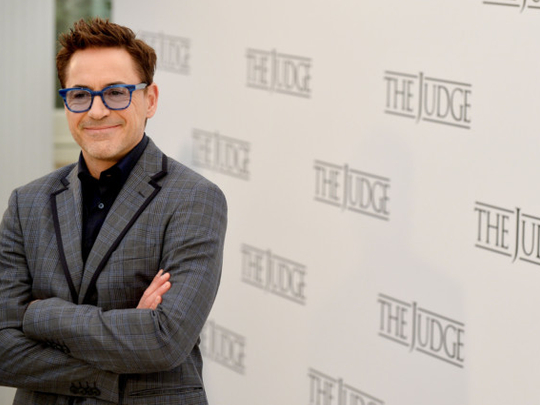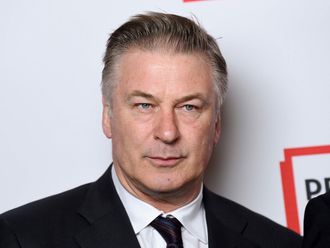
There are worse descriptions, as actor typecasting goes, than “wisecracking superhero”.
Then again, if you’re Robert Downey Jr. and colourful descriptions are what you trade in, it could start to feel a little bit limiting.
The wheel turns quickly in Hollywood. What barely six years ago was talk of “Can Downey really pull off a superhero?” has slowly changed into “How much longer is Downey going to keep doing this superhero thing?” Four times out as Iron Man (with a fifth such tentpole, The Avengers: Age of Ultron, on the way in May) and a couple of superhero-like Sherlock Holmes pictures, and that can start to happen.
So an actor who’s morphed from wunderkind to cautionary tale to comeback story to (in some minds) a cliche all seemingly before our eyes is seeking a new phase, something less describable, though that doesn’t mean Downey won’t try.
“The first [Iron Man] was heart, heart, heart,” he said. “Now the Tony Stark persona is eating itself. It hasn’t gotten away from me. But I realise I’m on the wheel.”
Clout, bankability
The actor has a don’t-call-it-a-plan plan, an idea for another act, one in which he essentially aims to combine the freshness and intimacy of his early chapter with the clout and bankability of his recent one.
Step one in that process is The Judge, out in the UAE on Thursday. The first movie to come from Team Downey — both a state of mind and, as a production company he founded with his wife, Susan, four years ago, a legal entity — The Judge is a throwback courtroom and family melodrama that tries to have it both ways, in a good way.
It’s directed by a Hollywood comedy mainstay in David Dobkin (Wedding Crashers) and contains a big John Grisham-style hook — but is also, in the manner of a bona fide drama, driven by a father-son blood feud, interested in emo-soundtrack melancholy and full of intense moments with Robert Duvall.
When Downey’s slick Chicago lawyer Hank returns to his small-town Indiana home upon the death of his mother, he finds himself in a complicated dance with his estranged dad, the titular judge (Duvall), who has been accused of murder and, reluctantly, hires Hank to defend him.
The Judge doesn’t entirely tone down Downey’s more gregarious, Tony Starkian instincts (your “hyper-verbal vocabulary vomit,” as the love interest played by Vera Farmiga says of his character in the film). But it doesn’t always use them as a crutch either.
Viewer experience
Susan Downey described the viewer experience of the film as “watching the Robert they think they know, who’s quick-witted and fast-talking and very smart, but he’s on an emotional journey where those tricks won’t work.”
Or in the patois that could be called Downey-speak, he said, “I think what you can tell is if you feel like you’re hitting the same note, you need to flex, and the funny thing is I would find myself weeping not really for my own catharsis because the effective story, A to Z, is laid out, and it ceases to be what it’s talking about, but how these themes and algorithms unfold for me.”
The actor comes off as highly aware of his own image, the divisions it has caused fans, the restlessness it has stirred in him.
Said Susan: “He’s one of the most grounded people you’ll ever meet, and you’ll be able to have that conversation with him. And as soon as you feel that way, he’ll go on a tangent you’ll have no ability to follow.”
She laughed. “I think he’s wired differently than a lot of us, and as much as he makes attempts every day to be a linear thinker, it’s really not his default setting.” She added, “It’s really exciting for everyone else, but I think it can sometimes be exhausting for him.”
(Of Susan, pregnant with the couple’s second child and his guide and producer in more tangible Hollywood ways, Downey said, “My wife points true north. People think she’s Spock with [breasts], and what she presents to the world is a very structured personality, but she’s this highly intuitive, creative person.”)
Emotional fireworks
The Judge stands in sharp contrast to the slick entertainment of modern Hollywood, and one can imagine someone who wants to get a little bit away from that kind of Hollywood without descending into preciousness (“Beware the passion project,” Downey says, making a cross with his fingers) would choose exactly this piece of zeitgeist denial. Downey has, indeed, gone against Tony Stark and Sherlock Holmes type with this film — not by returning to the hard-boiled Less Than Zero or the quiet charms of Chaplin of his early career but by returning to a time when tentpole entertainment was about emotional fireworks instead of whiz-bang effects. Downey calls the film “a really nice, long intermission between outright capitalism.”
Can he do it? Can he play someone different from how we’ve seen him when his skill, his charm, his Downey-ness are so tied up with his public and industry reputation.
He and Susan believe he can. Even as Team Downey develops Sherlock Holmes 3, there’s a project about the World War II naval carrier the Indianapolis and a new take on Pinocchio and other movies that Downey could produce or act in or even write, as well as several TV dramas the company is developing.
Then he takes a pause to go linear. “I think it would be a shame if I squandered whatever opportunity has arisen by just playing it safe.”












